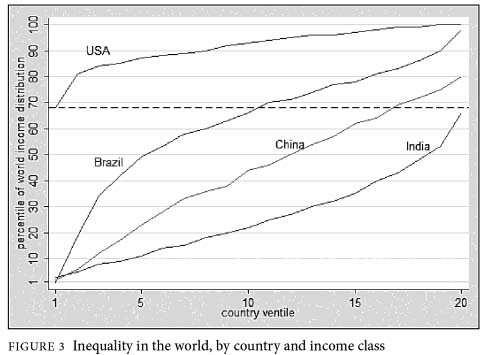Occupy [Place] and Inequality |
October 13th, 2011 |
| ea, inequality, money, occupy_place |
Income inequality in the United States is huge, both in absolute terms and compared to other first world countries. A small number of people with very high paying jobs make much more than most people do; the top 20% earns 60% of total income, and the top 1% earns 25%.
Worldwide, however, income inequality is much larger. And americans are doing quite well. Have a look at this chart:
source and explanation
This chart compares how rich you are within you country to how rich you are in the world as a whole. A straight line going from the lower left to the upper right would indicate a country that exactly mirrored the world in income. A horizontal line would mean very low income inequality in a country, and the height of the line would indicate where their income level was compared to the world. The graph tells us that the poorest 5% in china are as poor as anyone in the world, but the richest 5% are in the top 20% of for world income. Now look at the united states. Our poorest 5% are in the 65th percentile overall. And most of the "99%" are in the top 10% for the world. We are a very rich country.
Fixing inequality in the united states would be good, but it's nowhere near as bad as global inequality. As people in the top 10% (or more) of the world, we have a huge amount of power to help the "global 99%" by earning as much as we can and donating it. If you have the potential to make a lot of money, perhaps even on wall street, you can do much more good by pursuing that career and donating just 10% of your income than you can protesting.
Comment via: google plus, facebook, substack
